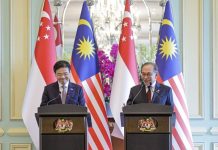Headlines:
- No discussions to shut down vernacular schools in Malaysia
- British Prime Minister, Theresa May to step down on June 7
- A US$1.4 trillion India spending push tops Modi 2.0 agenda
- China’s biggest chip maker, SMIC, to withdraw from NYSE
- US beer industry blames Trump tariffs for 40,000 job losses
DPM says no discussions to shut down vernacular schools
Deputy Prime Minister Datuk Seri Dr Wan Azizah Wan Ismail said the government has not discussed calls by certain non-governmental organisations to shut down vernacular schools. She said such proposals were never raised at the weekly Cabinet meetings. Dr Wan Azizah, who is also Women, Family and Community Development Minister, said she had long been aware of such demands being made from time to time but there had never been any serious discussions on the matter. “The racial diversity of Malaysia is actually an advantage as it gives the people a chance to learn multiple languages. There is nothing wrong about learning Mandarin, Tamil and English because we are multi-racial and multi-ethnic and should capitalise on this as our national asset. She was commenting on a memorandum from NGOs asking the government to shut down vernacular schools, which was handed over to Education Minister Dr Maszlee Malik two days ago. The memorandum was made following Dr Maszlee’s recent statement linking the matriculation quota to the requirement for Mandarin proficiency when applying for jobs in the private sector.
Theresa May to step down on June 7
British Prime Minister Theresa May (pic) on Friday announced in an emotional address that she will step down as Conservative leader on June 7 after failing to persuade MPs to support her Brexit deal. “It is and will always remain a matter of deep regret to me that I have not been able to deliver Brexit,” May, her voice breaking with emotion, said in a statement outside her Downing Street residence. The resignation will signal the formal start of a leadership contest during which May would remain as caretaker prime minister. “I will resign as leader of the Conservative and Unionist Party on Friday, 7th June,” May said. “The process for electing a new leadership should begin in the following week,” she said. The leadership race is expected to take several weeks. –
A US$1.4 trillion India spending push tops Modi 2.0 agenda
India’s economy is set for a major boost if Prime Minister Narendra Modi follows through with key campaign promises following his party’s sweeping election victory. The Bharatiya Janata Party pledged cash handouts to farmers, US$1.44 trillion to build roads, railways and other infrastructure, a boost to manufacturing, and a doubling in exports. Those promises, along with tax cuts for middle class Indians, resonated with voters, who gave the BJP a majority of the seats in the parliament, according to official results on Thursday. The economy is in need of stimulus. Consumer spending has taken a knock as a crisis among shadow banks curbed lending. Investments have slowed and unofficial figures show a pick-up in unemployment. Economists are forecasting economic growth of 6.5% in the three months to March, which would be the slowest pace since mid-2017. Fitch Ratings Ltd. said on Thursday improving the nation’s weak government finances will be crucial for the new administration. Fiscal consolidation stalled under the BJP in recent years and its campaign promise to support farm incomes has added to spending pressure, it said. The BJP’s manifesto targets 100 trillion rupees ($1.44 trillion) of capital investment in infrastructure by 2024. It’s a huge commitment considering the government’s expenditure on roads and railways was about 1.2 trillion rupees for the year to March 2019.
China’s biggest chip maker, SMIC, to withdraw from New York Stock Exchange as trade spat with US spills over to tech sector
China’s biggest maker of semiconductors is to withdraw from the New York Stock Exchange, bringing to an end its 15-year listing in the US, as the increasingly ferocious trade war with the US starts to make its mark in the technology sector. Semiconductor Manufacturing International Corp (SMIC) said on Friday evening it has notified NYSE of its intention to apply on June 3 to delist its American depositary receipts from the bourse. In a filing to the Hong Kong stock exchange, where its shares are listed, SMIC cited low trading volumes of its ADRs and the high costs of maintaining the listing, and complying with reporting requirements and related laws. The delisting is expected to happen after June 13, and trading of the chip maker’s US securities will shift to the over-the-counter market, the statement said. The board has already approved the proposal, it said, though SMIC will require permission from the Securities and Exchange Commission (SEC) too. The sudden move came at a time when Washington is stepping up efforts to cut off its technology from China, with trade negotiations between the world’s two largest economies still deadlocked. The Trump administration has put Huawei Technologies, China’s biggest telecoms equipment makers, on its so-called entity list that will virtually ban the company from buying key American technologies and products. The sanction may be expanded to include as many as five Chinese video surveillance companies including the largest, Hangzhou Hikvision Digital Technology, and Zhejiang Dahua Technology, according to media reports.
US beer industry blames Trump tariffs for 40,000 job losses
The US beer industry is blaming a jobs hangover on the Trump administration’s tariffs. A report by two trade groups showed US beer-industry jobs dropped 40,000 since 2016 as metal tariffs boosted aluminum-can costs, leading to a drop in investment. The biennial study by the Beer Institute and National Beer Wholesalers Association said direct, indirect and induced jobs fell to 2.19 million in 2018 from 2.23 million in 2016. Total cases of beer, wine and spirits consumed in the U.S. dropped 0.8% in 2018, the third consecutive year of declined, according to a report from IWSR, which studies the beverage market. The main culprit is the beer slump, with consumption down 1.5% as more drinkers gravitated to spirits and wine. A Beer Industry spokeswoman said Thursday in a statement that while the group can’t say tariffs are “100% to blame,” the evidence “supports that brewers are making fewer investments because of the added cost of aluminum.” The Beer Institute said jobs grew in the prior two-year period by 27%.
























